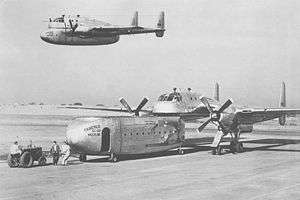Fairchild XC-120 Packplane
| XC-120 Packplane | |
|---|---|
 | |
| Composite image of the sole XC-120 on the ground, and in flight. | |
| Role | Military transport aircraft |
| Manufacturer | Fairchild |
| First flight | 11 August 1950 |
| Number built | 1 |
| Developed from | C-119 Flying Boxcar |
The Fairchild XC-120 Packplane was an American experimental transport aircraft first flown in 1950. It was developed from the company's C-119 Flying Boxcar, and was unique in the unconventional use of removable cargo pods that were attached below the fuselage, instead of possessing an internal cargo compartment.
Design and development
The XC-120 Packplane began as a C-119B fuselage (48-330, c/n 10312) which was cut off at a point just below the flight deck. The wings were angled upwards between the engines and the fuselage, raising the fuselage by several feet and giving the plane an inverted gull wing appearance. Smaller diameter "twinned" wheels were installed forward of each of the main landing gear struts to serve as nosewheels, while the main struts were extended backwards.
All four landing gear units, in matching "nose" and "main" sets, could be raised and lowered in a scissorlike fashion to lower the aircraft and facilitate the removal of a planned variety of wheeled pods which would be attached below the fuselage for the transport of cargo. The goal was to allow cargo to be preloaded into the pods; it was claimed that such an arrangement would speed up loading and unloading cargo.[1]
Production aircraft were to be designated C-128.
Operational history
Only one XC-120 was built. Though the aircraft was tested extensively and made numerous airshow appearances in the early 1950s the project went no further. It was tested by the Air Proving Ground Command at Eglin Air Force Base, Florida, in 1951,[2] before the project was abandoned in 1952.[3] The sole prototype was eventually scrapped.
Specifications (XC-120)


Data from [4]
General characteristics
- Crew: Five (pilot, copilot, flight engineer, two loadmasters)
- Capacity: 20,000 lb (2,700 cu.ft)
- Length: 82 ft 10 in (25.25 m)
- Wingspan: 106 ft 6 in (32.46 m)
- Height: 25 ft 1 in (7.65 m)
- Wing area: 1,447 sq ft (134.4 m2)
- Powerplant: 2 × Pratt & Whitney R-4360 Wasp Major radial engines, 3,250 hp (2,420 kW) each for takeoff
See also
- Related development
- Aircraft of comparable role, configuration and era
- Related lists
References
- ↑ Micheal O'Leary (November 1978). "Those Fabulous Flops". Air Progress.
- ↑ Staff, "XC-120 Goes to Eglin for Tests", Aviation Week, 11 June 1951, Vol. 54, No. 24, p. 15.
- ↑ "1946-1948 USAAF-USAF Serial Numbers". joebaugher.com. July 13, 2017. Retrieved August 7, 2017.
- ↑ "Cargo Carrier Concept"
- Evans, Stanley H. "Cargo Carrier Concept:Design-logic for Airborne Logistics: The Fairchild XC-120 Pack-plane". Flight, 21 September 1950. pp. 331–333.
External links
| Wikimedia Commons has media related to XC-120 Packplane. |
- Video about the XC-120
- The short film Big Picture: Chinese Reds Enter the Korean War is available for free download at the Internet Archive Contains segment about the plane.